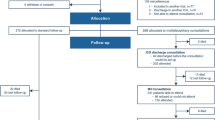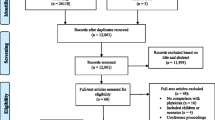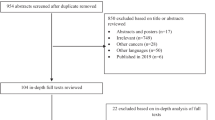Abstract
Objective
To evaluate outcomes of patients admitted to the ICU for complications after elective surgery and to assess perceived quality of life (pQOL) in survivors.
Design
Two-year prospective case-control study.
Setting
Twelve-bed ICU in a university-affiliated hospital.
Patients
Patients admitted to the ICU for a complication following elective surgery were included. Six months after discharge, pQOL was assessed using the Nottingham Health Profile (NHP). Results were compared to those of matched controls without complications.
Interventions
None
Measurements and results
Of the 182 patients, 124 were alive after 6 months, among whom 116 had 6-month data and 104 of these had matched controls. Overall pQOL as assessed by the global NHP score was similar in both groups (median, 0.82 and 0.87 in cases and controls; P=0.24). NHP subscores showed significantly worse pain (P=0.03) and physical impairment (P=0.02) in the ICU patients. In the multivariate analysis, pQOL was better in patients with cancer as the reason for surgery (P=0.05). Severity of illness at inclusion had no influence on subsequent pQOL, but cardiovascular dysfunction was associated with decreased energy (P=0.04).
Conclusions
Although overall pQOL was satisfactory after 6 months, patients admitted to the ICU for postoperative complications had worse pain and physical impairment than controls. Whether these outcomes could be improved by early physiotherapy and aggressive pain management deserves investigation.


Similar content being viewed by others
References
Suter P, Armaganidis A, Beaufils F, Bonfill X, Burchardi H, Cook D, Fagot-Largeault A, Thijs L, Vesconi S, Williams A (1994) Predicting outcome in ICU patients. Intensive Care Med 20:390–397
Task Force on Guidelines, Society of Critical Care Medicine (1988) Recommendations for ICU admission and discharge criteria. Crit Care Med 16:807–808
Le PMSI. Programme de Médicalisation des Systèmes d’Information: analyse médico-économique de l’activité hospitalière. Available online at: http://www.atih.sante.fr/pmsi
Le Gall JR, Lemeshow S, Saulnier F (1993) A new simplified acute physiologic score (SAPS II) based on European/North American multicenter study. JAMA 270:2957–2963
Fagon JY, Chastre J, Novara A, Medioni P, Gibert C (1993) Characterization of intensive care unit patients using a model based on the presence or absence of organ dysfunctions and/or infection: the ODIN model. Intensive Care Med 19:137–144
Hunt SM, Mc Kenna SP, Mc Ewen J, Backett EM, Williams J, Papp E (1980) A quantitative approach to perceived health status: a validation study. J Epidemiol Community Health 34:281–86
Hunt SM, Mc Kenna SP, Mc Ewen J, Williams J, Papp E (1981) The Nottingham health profile: subjective health status and medical consultations. Soc Sci Med 15A:221–229
Hunt SM, Mc Kenna SP, Williams J (1981) Reliability of a population survey tool for measuring perceived health problems: a study in patients with osteoarthrosis. J Epidemiol Community Health 35:297–300
Bucquet D, Condon S, Ritchie K (1990) The French version of the Nottingham health profile: a comparison of items weights with those of the source version. Soc Sci Med 30:829–835
Bucquet D, Condon S (1988) Indicateur de Santé Perceptuel de Nottingham: manuel d’utilisation. Inserm Unité 164
O’Brien BJ, Buxton MJ, Ferguson BA (1987) Measuring the effectiveness of heart transplant programmes: quality of life data and their relationship to survival analysis. J Chronic Dis 40:137S-153S
Heyland DK, Guyatt G, Cook DJ, Meade M, Juniper E, Cronin L, Gafni A (1998) Frequency and methodologic rigor of quality of life assessments in the critical care literature. Crit Care Med 26:591–598
Hurel D, Loirat P, Saulnier F, Nicolas F, Brivet F (1997) Quality of life 6 months after intensive care: results of a prospective multicenter study using a generic health status scale and a satisfaction scale. Intensive Care Med 23:331–337
Nielsen D, Sellgren J, Ricksten SE (1997) Quality of life after cardiac surgery complicated by multiple organ failure. Crit Care Med 25:52–57
Montuclard L, Garrouste-Orgeas M, Timsit JF, Misset B, De Jonghe B, Carlet J (2000) Outcome, functional autonomy, and quality of life of elderly patients with a long term intensive care unit stay. Crit Care Med 28:3389–3395
Gopal I, Bhonagiri S, Ronco C, Bellomo R (1997) Out of hospital outcome and quality of life survivors of combined acute multiple organ and renal failure treated with continuous veno/venous hemofiltration/hemodiafiltration. Intensive Care Med 23:766–772
European Guide to the Nottingham Health Status Profile (1989) The European Group for Quality of Life and Health Measurement
Niskanen M, Ruokunen E, Takala J, Rissanen P, Kari A (1999) Quality of life after prolonged intensive care. Crit Care Med 27:1132–1139
Short TG, Buckley TA, Rowbottom MY, Wong E, Oh TE (1999) Long term outcome and functional health status following intensive care in Hong Kong. Crit Care Med 27:51–57
Heyland DK, Hopman W, Coo H, Tranmer J, McColl MA (2000) Long-term health-related quality of life in survivors of sepsis. Short Form 36: a valid and reliable measure of health-related quality of life. Crit Care Med 28:3599–3605
Caine N, Harrison SCW, Sharples LD, Wallwork J (1991) Prospective study of quality of life before and after coronary artery bypass grafting. BMJ 202:511–516
Magni G, Unger HP, Valfre C, Polesel E, Cesari F, Rizzardo R, Paruzzolo P, Gallucci V (1987) Psychosocial outcome one year after heart surgery. A prospective study. Arch Intern Med 147:473–477
Trouillet JL, Scheimberg A, Vuagnat A, Fagon JY, Chastre J, Gibert C (1996) Long-term outcome and quality of life of patients requiring multidisciplinary intensive care unit admission after cardiac operations. J Thorac Cardiovasc Surg 112:926–934
Bashour CA, Yared JP, Ryan TA, Rady MY, Mascha E, Leventhal MJ, Starr NJ (2000) Long term survival and functional capacity in cardiac surgery patients after prolonged intensive care. Crit Care Med 28:3847–3853
Hund E (1999) Myopathy in critically ill patients. Crit Care Med 27:2544–2547
Zaren B, Hedstrand U (1987) Quality of life among long-term survivors of intensive care. Crit Care Med 15:743–747
Vazquez Mata G, Rivera Fernandez R, Perez Aragon A, Gonzales Carmona A, Fernandez Mondejar E, Navarrete Navarro P (1996) Analysis of quality of life in polytraumatized patients two years after discharge from an intensive care unit. J Trauma Injury Infect Crit Care 41:326–332
Vazques Mata G, Rivera Fernandez R, Gonzales Carmona A, Delgado-Rodriguez M, Torres Ruiz JM, Raya Pugnaire A, Aguayo de Hoyos E (1992) Factors related to quality of life 12 months after discharge from an intensive care unit. Crit Care Med 20:1257–1262
Acknowledgments
We thank Dr. Jean-Yves Fagon for his expert advice and Dr. A. Wolfe for reviewing the manuscript. We are also grateful to C. Bonnet, Dr. R. Caliandro, Dr. N. Cathala, A. Chenevez, Dr. C. Denet, C. Frérot RN, and Dr. J. Temkine, for assistance with data collection and screening.
Author information
Authors and Affiliations
Corresponding author
Rights and permissions
About this article
Cite this article
Lamer, C., Harboun, M., Knani, L. et al. Quality of life after complicated elective surgery requiring intensive care. Intensive Care Med 30, 1594–1601 (2004). https://doi.org/10.1007/s00134-004-2260-2
Received:
Accepted:
Published:
Issue Date:
DOI: https://doi.org/10.1007/s00134-004-2260-2




